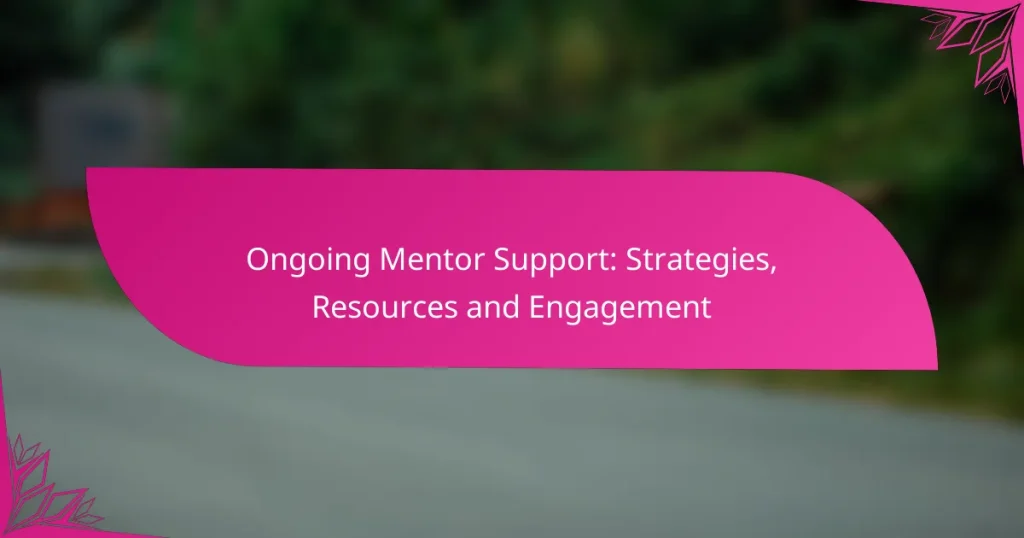Ongoing mentor support is crucial for fostering productive relationships and ensuring continuous development for both mentors and mentees. By implementing effective strategies such as regular communication and structured goal-setting, mentors can maintain engagement and provide valuable feedback. Additionally, leveraging technology and accessing a variety of resources can enhance the mentoring experience, facilitating better collaboration and progress tracking.

What are effective strategies for ongoing mentor support?
Effective strategies for ongoing mentor support include regular communication, structured goal-setting, and continuous feedback. These approaches foster a productive relationship between mentors and mentees, ensuring that both parties remain engaged and focused on development.
Regular check-ins
Regular check-ins are essential for maintaining momentum in the mentoring relationship. Schedule these meetings weekly or bi-weekly to discuss progress, challenges, and any adjustments needed in the mentoring approach. Consistency helps build trust and keeps both parties accountable.
During check-ins, use open-ended questions to encourage dialogue. For example, ask the mentee what they have learned since the last meeting or what obstacles they are currently facing. This promotes a deeper understanding of their needs and fosters a supportive environment.
Goal-setting frameworks
Implementing goal-setting frameworks such as SMART (Specific, Measurable, Achievable, Relevant, Time-bound) can enhance clarity in the mentoring process. Establish clear objectives that the mentee aims to achieve within a defined timeframe. This structure helps track progress and provides a sense of accomplishment.
Encourage the mentee to break larger goals into smaller, manageable tasks. This approach not only makes the goals less daunting but also allows for incremental achievements that can be celebrated along the way.
Feedback loops
Creating feedback loops is crucial for ongoing mentor support. Regularly solicit feedback from the mentee about the mentoring process and their personal development. This can be done through informal conversations or structured surveys.
Incorporate constructive feedback into the mentoring sessions to help the mentee improve their skills. Encourage them to provide feedback on your mentoring style as well, fostering a two-way learning experience that benefits both parties.
Resource sharing
Sharing relevant resources is a key strategy for effective mentoring. Provide access to articles, books, online courses, or industry-specific tools that can aid the mentee’s development. Tailor these resources to their specific goals and interests to maximize their relevance.
Consider creating a shared digital folder where both mentor and mentee can contribute resources. This collaborative approach not only enriches the learning experience but also encourages active participation from the mentee.
Networking opportunities
Facilitating networking opportunities is an important aspect of ongoing mentor support. Introduce the mentee to professional contacts, industry events, or relevant online communities. This exposure can significantly enhance their career prospects and professional growth.
Encourage the mentee to attend workshops or conferences where they can meet others in their field. Networking not only builds their professional circle but also helps them gain insights and perspectives that can inform their development journey.

How can technology enhance mentor engagement?
Technology can significantly boost mentor engagement by providing tools that facilitate communication, organization, and collaboration. By leveraging various digital platforms, mentors and mentees can connect more effectively, track progress, and share resources seamlessly.
Virtual meeting platforms
Virtual meeting platforms like Zoom, Microsoft Teams, and Google Meet allow mentors and mentees to meet face-to-face regardless of location. These tools often include features such as screen sharing, recording, and breakout rooms, which can enhance the learning experience.
When choosing a platform, consider factors like ease of use, accessibility, and the ability to integrate with other tools. For instance, Zoom offers a free tier that can accommodate up to 100 participants for 40 minutes, making it suitable for group mentorship sessions.
Mentorship management software
Mentorship management software, such as MentorcliQ or Chronus, helps organize mentorship programs by tracking participant progress and facilitating matching between mentors and mentees. These platforms often include dashboards that provide insights into engagement levels and program effectiveness.
When selecting software, look for features like automated scheduling, feedback collection, and resource sharing. Many platforms offer tiered pricing based on the number of users, which can range from a few hundred to several thousand dollars annually.
Collaboration tools
Collaboration tools like Slack, Trello, and Asana enhance communication and project management between mentors and mentees. These platforms allow users to create shared workspaces, set tasks, and communicate in real-time, fostering a more interactive mentorship experience.
To maximize the benefits of collaboration tools, establish clear guidelines on usage and communication frequency. For example, using Slack for quick questions and Trello for project tracking can streamline interactions and keep both parties aligned on goals.

What resources are available for mentors and mentees?
Mentors and mentees can access a variety of resources designed to enhance their relationship and support development. These resources include online courses, webinars, workshops, and comprehensive mentorship guides that provide valuable insights and strategies.
Online courses
Online courses offer structured learning opportunities for both mentors and mentees. They typically cover essential topics such as effective communication, goal setting, and feedback techniques. Platforms like Coursera or Udemy provide courses that can range from free to a few hundred dollars, allowing flexibility in budget and learning pace.
When selecting an online course, consider the course content, duration, and user reviews to ensure it meets your specific needs. Look for courses that offer practical exercises and real-world applications to maximize learning outcomes.
Webinars and workshops
Webinars and workshops provide interactive learning experiences that can deepen understanding and engagement. These sessions often feature expert speakers who share insights and facilitate discussions on relevant mentorship topics. Many organizations offer free or low-cost webinars, making them accessible to a wide audience.
To get the most out of these sessions, actively participate by asking questions and engaging with other attendees. Keep an eye on the schedule of relevant webinars and workshops to stay updated on new offerings that align with your mentorship goals.
Mentorship guides
Mentorship guides serve as comprehensive resources that outline best practices, strategies, and tools for effective mentoring relationships. These guides often include templates for goal setting, communication tips, and evaluation methods. Many are available for free from educational institutions or professional organizations.
Utilize mentorship guides to establish clear expectations and objectives with your mentee. Regularly revisit the guide to track progress and adjust strategies as needed, ensuring that both parties are aligned and benefiting from the mentorship experience.

What criteria should be used to select a mentor?
Selecting a mentor involves evaluating several key criteria to ensure a productive and supportive relationship. Focus on their experience, communication style, and availability to determine if they are the right fit for your needs.
Experience and expertise
When choosing a mentor, consider their professional background and specific expertise in your area of interest. A mentor with relevant experience can provide valuable insights and guidance based on real-world scenarios.
Look for someone who has achieved success in their field and possesses the skills you wish to develop. This could include industry knowledge, technical skills, or leadership experience.
Communication style
A mentor’s communication style is crucial for effective engagement. Assess whether they are approachable, open to questions, and able to provide constructive feedback in a way that resonates with you.
Consider arranging an initial meeting to gauge their communication approach. A good mentor should be able to adapt their style to suit your learning preferences, whether you prefer direct advice or a more collaborative discussion.
Availability and commitment
Ensure your potential mentor has the time and commitment to support your development. A mentor should be willing to dedicate regular time for meetings, whether weekly or bi-weekly, to discuss your progress and challenges.
Discuss their availability upfront and set clear expectations regarding the frequency and format of your interactions. This will help establish a productive mentoring relationship and ensure you receive the guidance you need.

How can ongoing mentor support be measured?
Ongoing mentor support can be measured through various methods that assess the effectiveness and impact of mentoring relationships. Key strategies include gathering feedback, tracking progress, and evaluating outcomes to ensure mentors provide valuable guidance.
Feedback surveys
Feedback surveys are a direct way to measure the effectiveness of mentor support. These surveys can include questions about the mentee’s satisfaction with the mentoring process, perceived value of the guidance received, and areas for improvement.
To create effective feedback surveys, consider using a mix of quantitative and qualitative questions. For example, a scale from 1 to 5 can gauge satisfaction, while open-ended questions can provide insights into specific experiences. Aim to distribute these surveys periodically, such as after key milestones or at the end of a mentoring cycle.
Common pitfalls include overly complex surveys that discourage completion or failing to act on the feedback received. Keep surveys concise and ensure that results are analyzed and shared to foster a culture of continuous improvement in mentoring practices.


